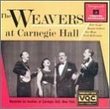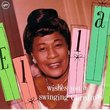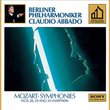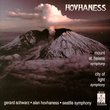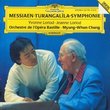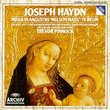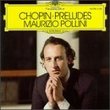| All Artists: Juan Crisostomo Arriaga, Carlos de Seixas, Joao de Sousa Carvalho, Antonio Leal Moreira, Marcos Antonio Portugal, Alvaro Cassuto, Algarve Orchestra Title: Arriaga: Symphony in D Members Wishing: 0 Total Copies: 0 Label: Naxos Original Release Date: 1/1/2000 Re-Release Date: 11/18/2003 Genre: Classical Styles: Opera & Classical Vocal, Forms & Genres, Theatrical, Incidental & Program Music, Historical Periods, Baroque (c.1600-1750), Classical (c.1770-1830), Symphonies Number of Discs: 1 SwapaCD Credits: 1 UPC: 747313220724 |
Search - Juan Crisostomo Arriaga, Carlos de Seixas, Joao de Sousa Carvalho :: Arriaga: Symphony in D
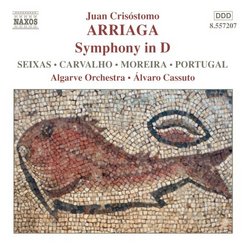 | Juan Crisostomo Arriaga, Carlos de Seixas, Joao de Sousa Carvalho Arriaga: Symphony in D Genre: Classical
Known as "The Spanish Mozart" after his premature death at the age of 19, Juan Crisóstomo Arriaga appears to us today as a talent of great promise. The precocious Symphony for large orchestra in D, a forerunner of Biz... more » |
Larger Image |
CD DetailsSynopsis
Album Description Known as "The Spanish Mozart" after his premature death at the age of 19, Juan Crisóstomo Arriaga appears to us today as a talent of great promise. The precocious Symphony for large orchestra in D, a forerunner of Bizet?s youthful Symphony in C, inhabits a world somewhere between Mozart and the early Romanticism of Beethoven or Schubert, or even of Rossini, which had already pervaded Europe but had not yet reached the Iberian Peninsula. Completing the disc are works by a group of composers who illustrate a rare continuity in Portuguese music, from the prolific Carlos Seixas, highly esteemed by Scarlatti, to the two most important Portuguese operatic composers, João de Sousa Carvalho and Marcos Portugal. Similarly Requested CDs
|
CD ReviewsAn Extremely Pleasant Disc--Just Roll Your Own Program! 03/02/2004 (5 out of 5 stars) "The only problem I can see with this enterprising and entertaining CD is that it is somewhat top-heavy. By that I mean the very best music is out of the way once the final chords of the Arriaga Symphony in D sound. And very fine music this symphony, by a musical prodigy who died at 19, is. As the informative notes to this CD point out, the Arriaga is work almost as astounding as Bizet's remarkably assured symphony written at the same age, 17. But while Bizet's work is all (or almost all) sunny, youthful charm, there is a pre-Romantic Sturm und Drang to the young Spaniard's symphony, with a grippingly dramatic first movement in D minor and a restless finale that starts in the same key, though its tragic overtones are softened by a tender Schubertian second melody in D major, from which the triumphant coda is drawn. There is a long, somber introduction, a patrician slow movement with more than a touch of melancholy, and a nominal minuet that recalls a Schubert symphonic scherzo. In all, this is a symphony of emotional maturity and musical craftsmanship unmatched except by Bizet and Mozart, with whom Arriaga is always compared but who didn't write a comparable symphony until he was an old man of...18 and penned his remarkable Symphony No. 25 in G minor!Equally remarkable is Arriaga's Overture Los esclovos felices, written when the composer was all of 13. It's a very enjoyable work in the Rossinian vein but with the same sort of gentle Schubertian melodies that grace the Symphony. Both these works have been well served on LP and CD, but these performances by Alvaro Cassuto and the young (founded 2002!) Algarve Orchestra are as fine as any I've heard and probably have the best, fully modern sound, which Naxos proudly advertises as the product of 24-bit technology. The only hitch at all is the discmates for the Arriaga works are not at all in the same league, least impressive of all being the limp Baroque meanderings of Carlos Seixas. Better, but still no great shakes, is the Overture to Carvalho's "L'amore industrioso," whose middle section again meanders too much, though the flanking fast sections afford effective curtain-raising gestures in the same vein as an early Mozart opera overture.Better by far are the Sinfonia by Moreira and the Overture to "Il Duca di Foix" by Portugal. Both these gents have imbibed the Italian opera overture style of Cimarosa, and they produce tuneful, colorfully orchestrated little pieces that I'm sure will prove fun to hear occasionally, especially in such enthusiastic and well-played and -recorded performances as here. But after the youthful genius that Arriaga's music represents, even they are something of a comedown. My solution? Program your CD player to play Carvahlo's work first followed by the Moreira and Portugal. Finish up with the Arriaga, and you have a very satisfying program. The Seixas will always be purely optional." Little-Known Iberian 18th-early 19th-c. Orchestral Music J Scott Morrison | Middlebury VT, USA | 01/09/2004 (4 out of 5 stars) "The main attraction here, for me, are the two works by the 'Spanish Mozart,' Juan Crisóstomo Arriaga (1806-1826, reportedly born precisely 50 years to the day after Mozart), who died at the unconscionable age of 19 and who wrote only three significant works, the Symphony and Overture included here and a set of string quartets. I've long admired the quartets but had never heard these orchestral works and I must say they are quite a discovery. The Overture to his opera, 'Los esclavos felices' ['The Happy Slaves,' talk about a non-pc subject!], was written and premièred successfully in Spain when he was only thirteen. If I heard it without knowing who wrote it I would think it was a previously unknown overture by Rossini. The Overture was written in 1819 and Arriaga might possibly have known something by Rossini, but I've read that Rossini's operas were late coming to Spain and 1819 was before Arriaga had moved to Paris to study with Fétis. Of course, there were similar precedents in 17th-c. Italian opera. Still, the occurrence of Rossinian melody and decorative elements, as well as the Rossinian crescendo-accelerando toward the end, are, to my ears, virtually indistinguishable from music by the Swan of Pesaro. Add to this the thoroughly winning melodies and rhythmic vitality and you have a true winner. It is amazing to me that I'd never heard this little masterpiece. It should be, at the very least, a frequent opener for symphony concerts.Then follows the Symphony in D (and this CD's excellent booklet annotator, Sérgio Azevedo, makes the valid point that one cannot call it either D major or D minor because Arriaga alternates between them frequently) was written when Arriaga was studying with François-Joseph Fétis in Paris. This would have been after his sixteenth birthday but the date is not precise. This symphony has often been compared to Bizet's Symphony in C for several reasons. Both of these symphonies were written by teenagers, then lost and not premièred until early in the 20th century. And they are the untroubled products of optimistic youth. Even though Arriaga's symphony opens with a Haydnesque adagio, the clouds soon part and we are launched into an Allegro vivace that, even though there is the switching back and forth between major and minor, is so rhythmically animated one cannot but smile. II is an Andante that sings lyrically. III is a lively minuet. [Fétis, an arch-conservative, must have loved this backward-looking movement.] IV is a bustling Allegro con moto whose classical orchestration [double winds and brass, strings, timpani] fairly sparkles. It reminds me a bit of the infectious finale of Haydn's Symphony No. 88. The two works by Arriaga comprise fully thirty minutes of this CD whose timing falls just shy of an hour. The rest of the disc is made up of works by Portuguese composers: a Sinfonia in B flat by Carlos Seixas (1704-1742), the Overture 'L'amore industrioso' by João de Sousa Carvalho (1745-1798), 'Sinfonia' by António Leal Moreira (1758-1798), and the Overture: 'Il Duca di Foix,' by Marcos Portugal (1762-1830). None of them is particularly memorable, at least when compared with the works by Arriaga. The Seixas sounds vaguely like Vivaldi. Carvalho was the teacher of both Moreira and Portugal. His Overture is second-rate Italianesque music reminiscent of, say, Paisiello. The Moreira Sinfonia is actually rather nice, starts out sounding for all the world like Bellini. It continues with a bouncy (and rather simple-mindedly ingratiating) tune that is orchestrated in a wind-band style similar that of early Verdi. Of the non-Arriaga pieces here my favorite is the Overture by Portugal. There is a ceremonial quality to the opening followed by a sprightly tune that skitters all over the orchestra. There are some pleasant uses of winds in thirds and even an almost-Rossini accelerando. This orchestra is based in the Algarve, a popular tourist destination in Portugal, and was founded only in 2002; the disc was recorded a couple of months later. Its conductor, Álvaro Cassuto, is well-known to those of us who have fallen head-over-heels in love with the music of 20th-c. Portuguese composer Joly Braga Santos. He has recorded all of Braga Santos's symphonies on Naxos and we are in his everlasting debt for that. The performances here are a bit rough and ready, not surprising for a new orchestra, but more than adequate for the music presented. There are other recordings of the Arriaga Symphony, but I've not heard them. I don't know of a recording of the Overture. And I don't believe there are widely available recordings of the Portuguese rarities here.Recommended for the Arriaga. Scott Morrison" Behind Mozart's shadow? I don't think so............ scarlatti11 | Killeen, TX United States | 02/26/2004 (5 out of 5 stars) "For comments like the one above many composers in history have to live behind the shadow of the other...He was born some exact time before or after Mozart, so what? how many other composers have not? I was born 4 months and 4 days after Shostakovich passed away, and what? I am a musician too, and so what? Juan Crisostomo Arriga also shared one of Mozart's middle names too!!!Arriga was a great composer in his own right...His music follows the criteria of the 18th century Italian style, but is a little less refined, but hey, still great music. Arriaga came to prominenece when some of his work was sent to Paris to the great singing master and teacher, Manuel Garcia(1806-1906). Arriaga is a great composer. The music of the other Portuguesse composers is great too. Carlos Seixas was mainly a harpsichord composer, very much in the vein of Scarlatti and Soler, so a symphony; in this symphony in his ouvre is a rarity as are a mass and a Harpsichord Concerto. Seixas was the one of the few if not the only one composer of his generation who did not studied in Italy...Music very different from that of Mozart...Performers and conductor do an outstanding job........."
|

 Track Listings (13) - Disc #1
Track Listings (13) - Disc #1
